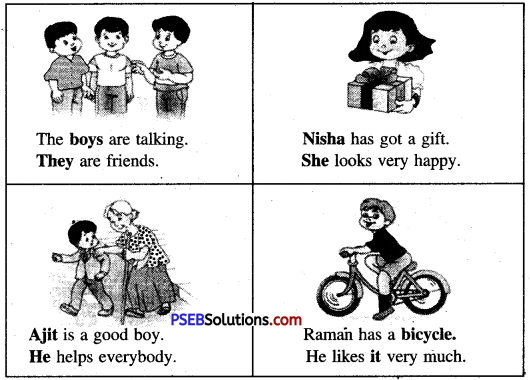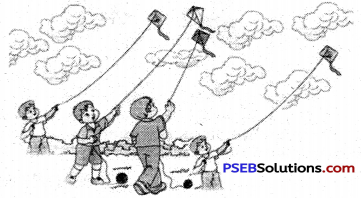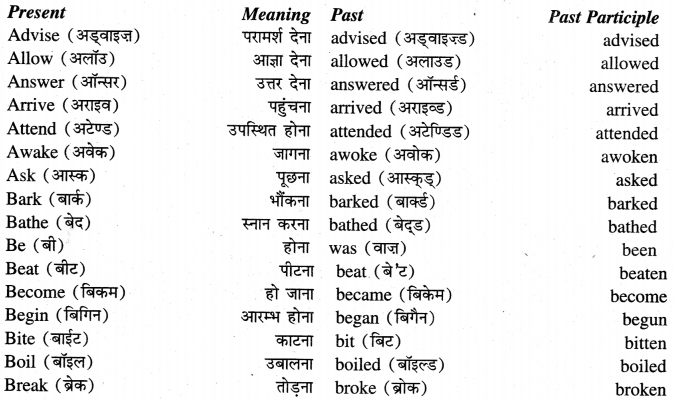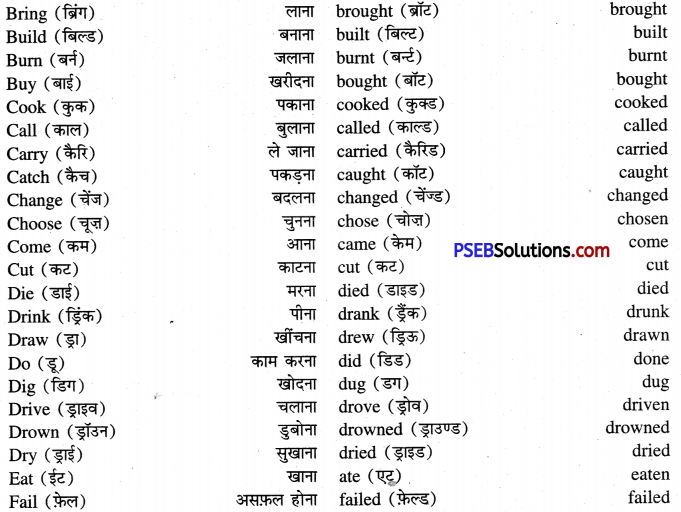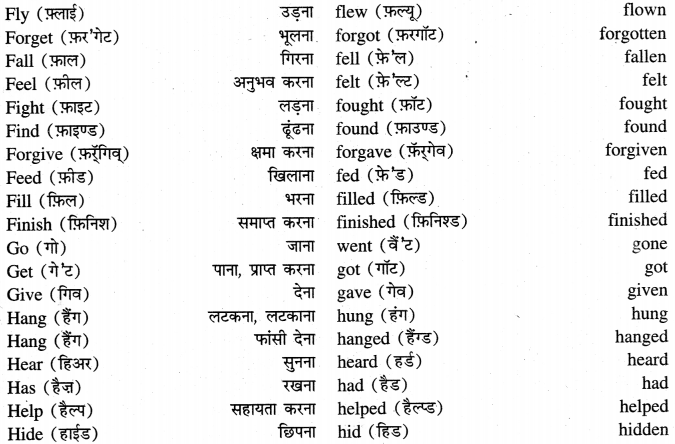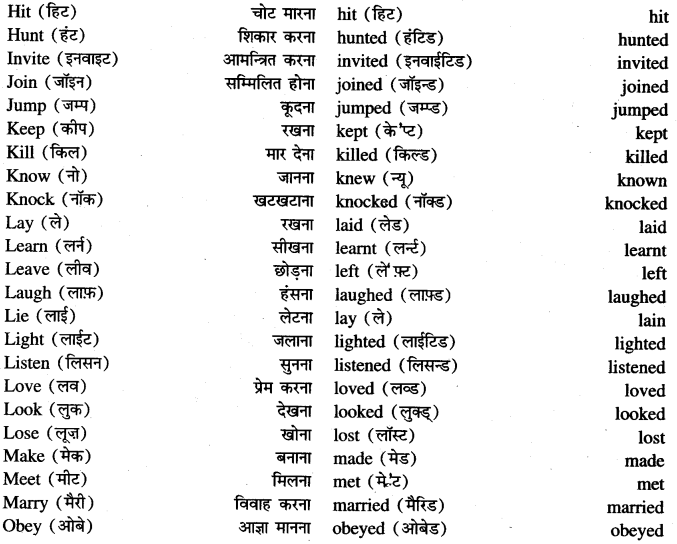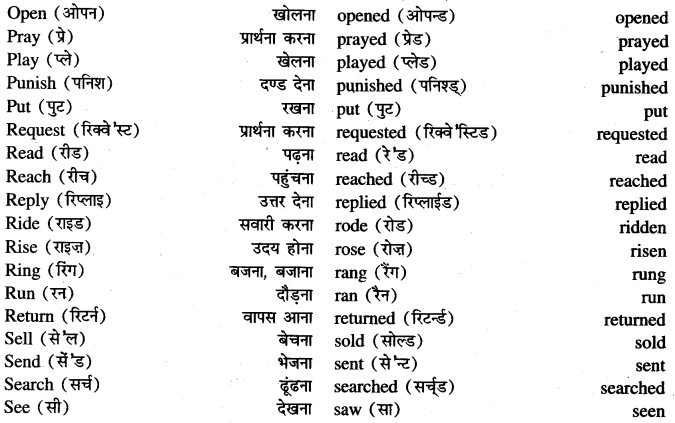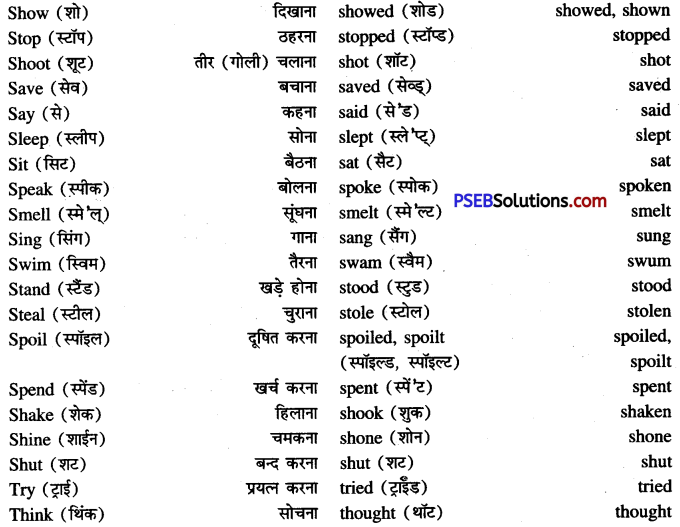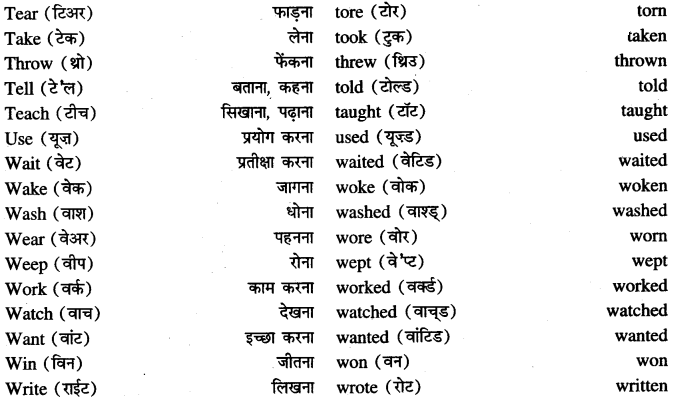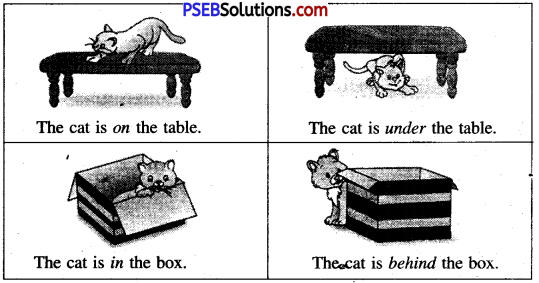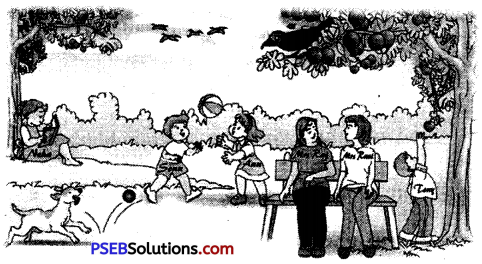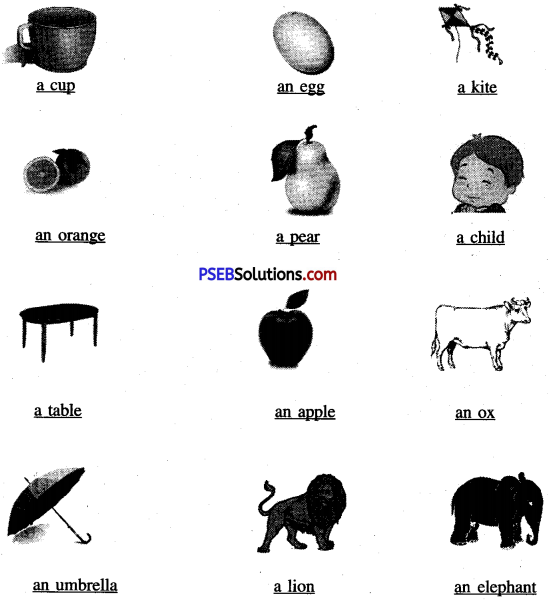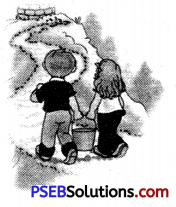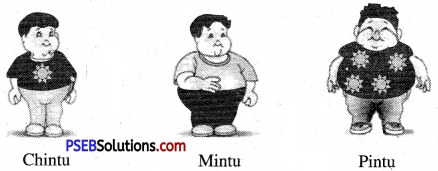Punjab State Board PSEB 6th Class English Book Solutions English Grammar Tenses Exercise Questions and Answers, Notes.
PSEB 6th Class English Grammar Tenses
The form of verb that shows the Time or State of an action is called the Tense.
Verb का जो रुप क्रिया के समय अथवा स्थिति के बारे में बताती है उसे Tense कहते है।
We have three main Tenses in English.
They are-
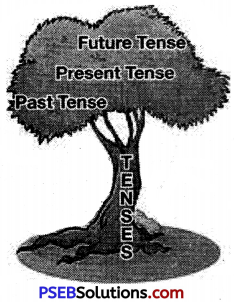
- The Present Tense वर्तमानकाल
- The Past Tense भूतकाल
- The Future Tense. भविष्यत्काल
![]()
Look at the following sentences:
- Tanu is here today.
- The girls are happy.
- Tanu was here yesterday.
- The girls were happy.
- Tanu will be here tomorrow.
- The girls will be happy.
Sentences 1 and 2 show the present state.
We can say they are in the Present Tense.
Sentences 3 and 4 show the past state.
We can say they are in the Past Tense.
Sentences 5 and 6 show the future state.
We can say they are in the Future Tense.
Please Note: 1. We use V1 for Present Tense.
2. We use V2 for Past Tense.
3. We use will / shall + V1 for Future Tense.
Forms of Tenses काल के रूप
Each Tense in English has four different forms:
- Indefinite
- Continuous
- Perfect
- Perfect Continuous
Thus, there are twelve different Tenses.
They are-
| 1. Present Indefinite | I write poems. |
| 2. Past Indefinite | I wrote poems. |
| 3. Future Indefinite | I shall write poems |
| 4. Present Continuous | I am writing poems. |
| 5. Past Continuous | I was writing poems. |
| 6. Future Continuous | I shall be writing poems. |
| 7. Present Perfect | I have written poems. |
| 8. Past Perfect | I had written poems. |
| 9. Future Perfect | I shall have written poems. |
| 10. Present Perfect Continuous | I have been writing poems. |
| 11. Past Perfect Continuous | I had been writing poems. |
| 12. Future Perfect Continuous | I shall have been writing poems. |
1. Present Indefinite Tense
The Present Indefinite Tense is used to express a universal truth (सर्वमान्य सत्य) or habitual action (आदत की क्रिया)”; as-
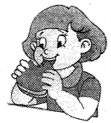
- The baby likes bread.
- We do our duty.
- Aman speaks the truth.
- The earth moves round the sun.
The underlined verbs are all in the Present Indefinite Tense.
For Positive Statements in this tense:
We use V1 for I, You and a Plural subject; as,

- You learn your lessons.
- We pray to God daily
- I buy milk from this dairy.
We use V1 + s/es, for third person Singular subject; as,

- Meena tells lies.
- My sister cooks delicious food.
- Mr. Singh teaches us English.
Exercises (Solved)
I. Put each sentence into the plural:

1. A cat eats meat.
2. A dog hates a cat.
3. A writer writes a book.
4. An apple grows on a tree.
Answer:
Cats eat meat.
2. Dogs hate cats.
3. Writers write books
4. Apples grow on trees.
![]()
II. Put each sentence into the singular:
1. Houses have roofs.
2. Postmen wear caps.
3. They drink tea out of cups.
4. Classrooms have blackboards.
Answer:
1. A house has a roof.
2. A postman wears a cap.
3. He/She drinks tea out of a cup.
4. A classroom has a blackboard.
Framing Negative Questions
We use do not + V1 for I, you and a Plural subject; as-
1. They do not learn their lessons.
2. You do not do your homework daily.
3. We do not buy milk from this dairy.
We use does not + V1 for third person Singular subject; as
1. She does not waste her time.
2. Rita does not cook delicious food.
3. Mr. Singh does not teach us English.
Exercise (Solved)
Rewrite each sentence as a Negative:
1. Ram goes home for lunch.
2. I like coffee.
3. She looks beautiful.
4. These boys run fast.
5. We go for a walk daily.
6. You obey your teachers.
7. He takes care of his health.
8. “They take tea in the evening.
Answer:
1. Ram does not go home for lunch.
2. I do not like coffee.
3. She does not look beautiful.
4. These boys do not run fast.
5. We do not go for a walk daily.
6. You do not obey your teachers.
7. He does not take care of his health.
8. They do not take tea in the evening.
Framing Questions
We use the following sentence pattern:
Do + Plural subject + V1 + Complement ?
Does + third person Singular subject + V1 + Complement ?
Exercise (Solved)
Rewrite each sentence as a Question:

1. Owls hoot at night.
2. They work on Sundays.
3. Children play on the road.
4. A postman delivers letters.
5. Farmers grow crops for us.
6. Mosquitoes spread Malaria.
7. She helps her mother in the kitchen.
8. Your brother knows many people in this town.
Answer:
1. Do owls hoot at night ?
2. Do they work on Sundays ?
3. Do children play on the road ?
4. Does a postman, deliver letters ?
5. Do farmers grow crops for us ?
6. Do mosquitoes spread Malaria ?
7. Does she help her mother in the kitchen ?
8. Does your brother know many people in this town?
Framing Negative Questions
We can put not before the main verb or in short form after the helping verb; as-

1. Does Rani not tell lies ?
= Doesn’t Rani tell lies ?
2. Do you not take a bath daily ?
= Don’t you take a bath daily ?
Exercise (Solved)
Rewrite each sentence as a Negative Question:

1. Do cows live on grass ?
Do cows not live on grass ?
(or)
Don’t cows live on grass ?
Note : Do not = Don’t
Does not = Doesn’t
2. She does not like coffee.
3. The sun rises in the east.
4. Do they come here daily ?
5. Does Kusha bring flowers ?
6. We do not pluck the flowers.
7. Does Nitin obey his parents ?
8. He does not drive his car very fast.
9. These boys do not respect their teachers.
Answer:
2. Does she not like coffee ?
Or
Doesn’t she like coffee ?
3. Does the sun not rise in the east ?
4. Do they not come here daily ?
Or
Don’t they come here daily ?
5. Does Kusha not bring flowers ?
6. Do we not pluck the flowers ?
7. Does Nitin not obey his parents ?
8. Does he not drive his car very fast ?
9. Do these boys not respect their teachers ?
![]()
2. Past Indefinite Tense
Past Indefinite Tense is used to express an action which took place in the past or was completed before the time of speaking; as-
Past Indefinite Tense का प्रयोग बीते समय (भूतकाल) में हुई क्रिया के लिए किया जाता है जो उसके बारे में बात करने से पहले ही पूरी हो गई हो।
- Simi liked ice cream.
- Rohan went to the market.
For Positive Statements in this tense, we use V1 with all subjects (singular or plural); as-

- He worked hard.
- We took milk in the morning today.
- I bought this book last week.
Exercise (Solved)
Rewrite each sentence using the Past form of the given verbs:

1. Rahul (want) a shirt.
2. Deepa (eat) an ice cream.
3. Nancy (wear) simple clothes.
4. Raj (come) to India in March.
5. They (build) a house in Delhi.
6. The boys (laugh) at the beggar.
7. I (go) to the market with my friend.
8. My mother (buy) a new dress for me.
Answer:
1. Rahul wanted a shirt.
2. Deepa ate an ice cream.
3. Nancy wore simple clothes.
4. Raj came to India in March.
5. They built a house in Delhi.
6. The boys laughed at the beggar.
7. I went to the market with my friend.
8. My mother bought a new dress for me.
Negative Statements
We use did not + V1 for all subjects (singular or plural); as-

- He did not work hard.
- We did not take milk in the morning today.
- I did not buy this book last week.
Please note that did always take V1 form with it; it never takes V2 form.
Exercise (Solved)
Rewrite each sentence as a Negative:
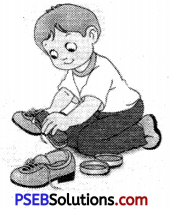
1. Misha told the truth.
Misha did not tell the truth.
2. He took my pen.
3. Tony polished his shoes.
4. She cooked food for me.
5. Rohan respected his teachers.
6. They finished their work in time.
7. The naughty boys broke the glass.
8. Ranjan and his friends went for a picnic.
Answer:
2. He did not take my pen.
3. Tony did not polish his shoes.
4. She did not cook food for me.
5. Rohan did not respect his teachers.
6. They did not finish their work in time.
7. The naughty boys did not break the glass.
8. Ranjan and his friends did not go for a picnic.
For Questions
We use the following sentence pattern:

Exercise (Solved)
Rewrite each sentence as a Question:

1. Nancy danced at the party.
Did Nancy dance at the party ?
2. He invited us to dinner.
3. My uncle sent me a gift.
4. Our team won the match.
5. You paid your fees yesterday.
6. We spent our holidays at Shimla.
7. They plucked flowers in the garden.
8. Sonu broke his leg in the accident.
Answer:
2. Did he invite us to dinner ?
3. Did my uncle send me a gift ?
4. Did our team win the match ?
5. Did you pay your fees yesterday ?
6. Did we spend our holidays at Shimla ?
7. Did they pluck flowers in the garden ?
8. Did Sonu break his leg in the accident ?
For Negative Questions
We can put not before the main verb or in short form after the helping verb; as
1. Did she not tell lies ?
= Didn’t she tell lies ?
2. Did you not apply for the post ?
= Didn’t you apply for the post ?
Exercise (Solved)
Rewrite each sentence as a Negative Question:
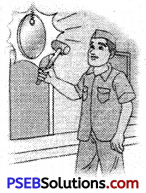
1. Did the peon ring the bell ?
Did the peon not ring the bell ?
(or)
Didn’t the peon ring the bell ?
2. Did he tell a lie ?
3. We called him a fool.
4. Reeta ate all biscuits.
5. Did she reply your letter ?
6. Your sister painted this picture.
7. Did she finish her work in time ?
8. Did they congratulate you on your success ?
Answer:
2. Did he not tell a lie ?
(or)
Didn’t he tell a lie ?
3. Did we not call him a fool ?
4. Did Reeta not eat all biscuits ?
5. Did she not reply your letter ?
6. Did your sister not paint this picture ?
7. Did she not finish her work in time ?
8. Did they not congratulate you on your success ?
![]()
3. Present Continuous Tense
Present Continuous Tense is used to express an action that is going on at the time of speaking; as-
- Radha is doing her homework.
- Mona is cooking food in the kitchen.
The italicised words express an action which is going on at present. So we can say these sentences are in the Present Continuous Tense.
Positive Statements (is/am/are + V1 -ing)
- I am flying a kite.
- She is doing her work.
- They are reading a new lesson.
Negative Statements (is/am/are + not + V1 -ing)
- I am not flying a kite.
- She is not doing her work.
- They are not reading a new lesson.
Questions
(Helping verb before the Subject)
- Am I flying a kite ?
- Is she doing her work ?
- Are they reading a new lesson ?
Negative Questions
(‘not is used before the main verb or in short form after the helping verb)

1. Am I not flying a kite ?
= An’t I flying a kite ?
(We use an’t in spoken language only.)
2. Is she not doing her work ?
= Isn’t she doing her work ?
3. Are they not reading a new lesson ?
= Aren’t they reading a new lesson ?
Exercises (Solved)
I. Use the Present Continuous Tense to complete each sentence:

1. Mona …………… a test. (take)
2. I ………. my breakfast. (have)
3. The hunter …………. the lion. (kill)
4. The trees …………… their leaves. (shed)
5. The farmers ……….. their fields. (water)
6. The pain in my arm ………… worse. (get)
7. The tailors………… the uniforms. (not make)
Answer:
1. Mona is taking a test.
2. I am having my breakfast.
3. The hunter is killing the lion.
4. The trees are shedding their leaves.
5. The farmers are watering their fields.
6. The pain in my arm is getting worse.
7. The tailors are not making the uniforms.
II. Rewrite each sentence as a question:

1. I am reading a book.
2. She is not doing her work.
3. They are watching a movie.
4. You are not listening to me.
5. We are going for a picnic today.
6. The girls are playing in the park.
7. The boys are not teasing the animals.
Answer:
1. Am I reading a book ?
2. Is she not doing her work ?
3. Are they watching a movie ?
4. Are you not listening to me ?
5. Aren’t we going for a picnic today?
6. Are the girls playing in the park ?
7. Are the boys not teasing the animals ?
4. Past Continuous Tense
The Past Continuous tense is used to express an action which was actually taking place at some particular moment (विशेष क्षण/समय पर) in the past.
Positive Statements
We use was/were + V1 -ing; as-

- Harjit was reading a book.
- They were going to the fair.
Negative Statements
We use was/were + not + V1 -ing; as-
- Harjit was not reading a book.
- They were not going to the fair.
Questions
We put the helping verb before the subject; as-
- Was Harjit reading a book ?
- Were they going to the fair ?
Negative Questions
We can put ‘not before the main verb or in short form after the helping verb; as-
1. Was Harjit not reading a book ?
= Wasn’t Harjit reading a book ?
2. Were they not going to the fair ?
= Weren’t they going to the fair ?
![]()
Exercises (Solved)
I. Complete each sentence using the Past Continuous Tense:

1. Children ………….. in the bushes. (hide)
2. They ………. through the zoo. (walk).
3. The waiter ……….. the people. (serve)
4. Meera …………. with her friends. (not play)
5. The baby ………. all the morning. (not cry)
6. The dancers ………… on the stage. (not perform)
Answer:
1. Children were hiding in the bushes.
2. They were walking through the zoo.
3. The waiter was serving the people.
4. Meera was not playing with her friends.
5. The baby was not crying all the morning.
6. The dancers were not performing on the stage.
II. Rewrite each sentence as a question:

1. The peon was ringing the bell.
2. We were not going to our village.
3. The boys were wearing red turbans.
4. Hema was not working at that time.
5. The children were playing in the street.
6. The teacher was writing on the blackboard.
7. The little girl was not playing with her doll.
8. Anu and Rosy were not talking to each other.
Answer:
1. Was the peon ringing the bell ?
2. Were we not going to our village ?
3. Were the boys wearing red turbans ?
4. Was Hema not working at that time?
5. Were the children playing in the street ?
6. Was the teacher writing on the blackboard ?
7. Was the little girl not playing with her doll ?
8. Were Anu and Rosy not talking to each other?
Miscellaneous Exercises
I. Use Simple Past form of the given verb to complete each sentence:
1. Did you ………….. this film ? (enjoy)
2. Did Roma …………. this picture ? (paint)
3. Columbus ……….. America in 1492. (discover)
4. She ………. to her village last month. (go)
5. The peon ……….. (not) the bell in time. (ring)
6. The fool didn’t ………. from experience. (learn)
Hints.
1. enjoy
2. paint
3. discovered
4. went
5. did not ring
6. learn.
II. Use Simple Present form of the given verb to complete each sentence:
1. I …….. for a walk daily. (go)
2. The sun …………… in the east. (rise)
3. They ……………. (not) bad workers. (like)
4. Kusha …………. (not) her parents. (obey)
5. Teachers …………… good students. (love)
6. We ………… milk and eggs for breakast.
Hints:
1. go
2. rises
3. do not like
4. does not obey
5. love
6. take
III. Rewrite each sentence in Past Indefinite Tense:

1. The bird flies to its nest.
2. They drink coffee every day.
3. Does he pay his fees regularly ?
4. Do you have milk for breakfast ?
5. Do we not fall ill by over-eating ?
6. You do not finish your work in time.
7. Kusha does not wear simple clothes.
8. Does he not help his friends in need ?
Answer:
1. The bird flew to its nest.
2. They drank coffee every day.
3. Did he pay his fees regularly ?
4. Did you have milk for breakfast ?
5. Did we not fall ill by over-eating ?
6. You did not finish your work in time.
7. Kusha did not wear simple clothes.
8. Did he not help his friends in need ?
![]()
IV. Rewrite each sentence in Past Continuous Tense:
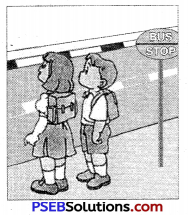
1. Isn’t it raining heavily ?
2. We are waiting for the bus.
3. The teacher is teaching the children.
4. I am not living with my aunt these days.
5. They are not going home in the evening.
6. Is the lady knitting a sweater for her son ?
7. Aren’t Anu and Manu playing in the street ?
8. Am I wasting my time in watching Discovery Channel ?
Answer:
1. Wasn’t it raining heavily?
2. We were waiting for the bus.
3. The teacher was teaching the children.
4. I was not living with my aunt these days.
5. They were not going home in the evening.
6. Was the lady knitting a sweater for her son ?
7. Weren’t Anu and Manu playing in the street ?
8. Was I wasting my time in watching Discovery Channel ?
V. Rewrite each sentence in Present Continuous Tense:
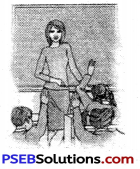
1. Do you not speak the truth?
2. The students ask many questions.
3. I sit on the front bench in my class.
4. Does Kamla teach dance and music ?
5. These boys do not respect their elders.
6. She does not play with the poor children.
Answer:
1. Are you not speaking the truth?
2. The students are asking many questions.
3. I am sitting on the front bench in my class.
4. Is Kamla teaching dance and music ?
5. These boys are not respecting their elders.
6. She is not playing with the poor children.
VI. Rewrite each sentence in Past Continuous Tense:

1. The girls did not pluck flowers.
2. Did the peon not ring the bell ?
3. Did Ram break the windowpanes ?
4. My friends talked to me in English.
5. The watchman did not open the gate.
6. He spent all his money in good deeds.
Answer:
1. The girls were not plucking flowers.
2. Was the peon not ringing the bell ?
3. Was Ram breaking the windowpanes.
4. My friends were talking to me in English.
5. The watchman was not opening the gate.
6. He was spending all his money in good deeds.
